Don't wanna be here? Send us removal request.
Text

Haru from Free! (a bit messy bc I was in a rush, might edit later)
@nanaseharukabirthdayexchange
35 notes
·
View notes
Text
Hi! I really enjoyed Your Name as well! I think it really does emphasize just how dangerous natural disasters can be and how much was one the line. If Mitsusha wasn’t able to convince everyone that they were in danger and people didn’t evacuate them, the entire village would have been wiped out. And there are many very real disasters in the real world that have destroyed home and towns and have killed many people, so natural disasters is a very real issue. Natural disasters like hurricanes are also worsened by climate change and pollution, so I think it also sends a message about the importance of addressing these issues and taking care of our planet.
Your Name | Themes of National Discourse

The Plot Of The Anime
The story begins with highschool students female protagonist Mitsuha Miyamizu and male protagonist Taki Tachibana. Mitsuha Miyamizu lives in a rural location called Itomori where she performs rituals on the family shrine, while Taki Tachibana lives in a busy location where he works a part-time job and has future job goals. However, both lives change as they start to swap bodies (a dream at first thought, but it's actually real). This is due to Miyamizu's wishes of living as a handsome boy in Tokyo as she has poor relationships with her strict family, which some supernatural powers swapped her with a random guy. After confusion over their new identities, they would start understanding their situations and know about each other's lives by leaving notes every swap. A crucial note is that Tachibana lives 3 years into the future and the swap takes him back and Miyamizu foward, where Tachibana saves Miyamizu, her family, and Itomori residents from the comet Tiamat, and then reality alters so they get to meet in-person. Throughout the film, we see ongoing themes of love and destiny between the two characters (like they are meant to be together).

The Issue In Question
This anime addresses multiple themes and issues seen in our society, but I want to name only two. We see that there is a divide between the rural and urban communities. In the anime, we can see the life Miyamizu is living: a rural small isolated town. She desires to want to move to more urbanized cities like Tokyo, which can lead to shrinking of those rural populations and the extinction of the traditions in it.
We can also acknowledge the themes of preparedness, especially in a natural disaster. In the anime, the TV forecasters did not expect the Tiamat comet to split off in its orbit, which eventually became too late, leading to the extinction of the Itomori town.

The Issue Addressed In Japan & Beyond
In our world, we can see government projects by Japan to boast tourism in more local areas and create an economy there. This is why Japan is one of the most popular tourist locations and is known for many of its cultures and traditions. This basically helps revitalize or slow down the rural town's extinction as people are flocking to more urban cities like Tokyo to get good income and be close to services and jobs. This can also be seen in other nations like United States, where the many rural areas struggle to maintain its population, like theres even a named town with only one person living.
For forecast-related themes, Japan's 2011 Tōhoku earthquake led to massive deaths and a tsunami as the forecasters put their faith in a faulty seismic device, which could've prevented deaths when evacuations would be announced. Same situations worldwide like hurricane forecasts would've prevented more deaths if the experts were careful about the dangers of these storms as they can suddenly ramp up in categories.

My Personal Takes
Honestly, this anime felt like a true masterpiece. I used to watch anime films as a child but I never got to watch newer ones like this as the thoughts of watching anime have long been gone, until recently.
I could probably relate to hurricane forecasts like hurricane Irma back in 2017. Thankfully, forecasters are much more accurate than in the past so we survived that major hurricane, or else we would've been impacted at a greater level. Forecasters are crucial in saving human lives as they announce if a specific event is feasible to evacuate from, however small mistakes can lead to significant lives to be lost so I am grateful for living in a much more modernized world.
4 notes
·
View notes
Text
Hi! I agree that representing the countries as people is a very unique way to retell stories and historical events especially to younger audiences without showing disturbing content. However, I do wonder if it may be perhaps harmful how the characters were portrayed, especially with how it portrayed sensitive events like World War II in a humorous and unserious way, which some could take as offensive or disrespectful. I also agree that Hetalia and other critiques on nationalism and historical events can also use visual rhetorics to try to influence the audience or support a specific view on events, so the content is often not unbiased.
Hetalia: Axis Powers | Themes of Media & Nationalism

The Plot Of The Anime
Hetalia: Axis Powers is a anime that takes on nationalistic and political topics and turn it into a satirical animation. In each short episodes, we can see that the nations and political groups are represented as human characters (anthropomorphized countries), where we can see the interactions of each nation through their stereotypical personalities and status, which I personally believe is genius way of retelling stories of historical events towards the broad and younger audience without incorporating much distressing or graphical content. Moreover, each short episodes are commonly themed around major world events like WWI and WWII, however it does expand into minor or fictional interactions between the characters.

The Issue In Question
Visual media, especially these anime episodes, represent a powerful narrative regarding nationalism and the cultural identities for each nation, as seen reflected from our real world's history and events. However, they are mainly expressed through stereotypes, which may not represent the nation or can differ from other nation's perspective as stereotypes are very subjective. Like I said, visual media itself is a very powerful medium to persuade (rhetoric) or bring in knowledge to their targeted audience (knowledge = power), through exaggerated expressions and art style choices. In this anime, the stereotypes are represented in a very exaggerated way, while making the show comedically and entertaining, can misrepresent the entire nation and its people in the real world. For example, Italy the character is represented as very sensitive, while Germany is represented as serious and aggressive. While an average viewer relates to these stereotypes, it doesn't actually represent all of the nation's population and can further push those stereotypical standards. The visual rhetoric element additionally can be powerful in ways to persuade people in a way propaganda does, using exaggerated elements to falsely favor people in serious real world situations.

The Issue Addressed In Japan & Beyond
Visual rhetorics and media have long been used to convince people to support or participate in nationalistic goals, however through creativity and exaggeration, it can also leak some misinformation of traits from specific nations or political groups to pull more power in from the people to those organizations or nations sending these media. One notable example is from Germany during WWII, where they would hand out visual rhetorics in forms of cartoons, portraying other countries like the United States as "corrupt" while displaying themselves as the more powerful and trustable nation. The visuals in propaganda are usually fantasized through body proportions and special added effects to bring in additional meanings, often for exaggeration.
On the other hand, visual media such as Hetalia can be beneficial to teach people in the real world about each country and culture, as well as the interactions in a less graphic way. However, the false representations and stereotypes are still relativity common in order to persuade the audience about what the country's identity is and their reason for their motives in historical events.

My Personal Takes
Today, I am very influenced by the media from around the world, whether that be social media, films, or the news. Social media would probably be one of the most influential, especially political memes that I happen to keep stumble into. The creators usually create exaggeration and stereotypes based on the government and the so called daily lives of the people in order to create comedically effects as well as to send a deeper meaning about their society, typically harsh like China or North Korea. All of this would shape how I perceive other countries and it does show how powerful media like Hetalia can be when they represent a real world country through their own stereotypes.
9 notes
·
View notes
Text
Hetalia was an interesting anime for sure. Essentially all of the characters are countries and represent stereotypes about the countries and their people. While it certainly can be humorous to watch characters representing countries, and the characters poked fun at different stereotypes, there are also concerns about stereotyping groups of people and that it can actually perpetuate these stereotypes further. Additionally, this time period for the anime was during World War II, which also makes it more controversial.
Hetalia can arguably be considered a visual rhetoric that can try to convince people to support or believe different nationalistic goals. Visual rhetorics can also spread misinformation through fallacies by cherry picking information or pretending that tragedies or crimes didn’t exist or that they are not as bad as they seem.
Overall, I am not sure how to feel about Hetalia. It faced much criticism from discussing sensitive topics in a lighthearted and unserious manner. In regards to the countries, it portrayed Germany as strict, efficient, and disciplined, Italy as cowardly, and Japan as quiet and mysterious. Meanwhile, America is portrayed as loud, talkative and self-centered, perpetuating stereotypes of Americans as being loud and inconsiderate. England is grumpy and loves tea, also showing stereotypes of the British, while France is romantic and flirtatious, relating France to romance and love. Meanwhile Russia is dark and intimidating and obsessed with “becoming” one with the other nations, which could be referencing the USSR’s attempts to take over other nations. Meanwhile China is portrayed as having no direction or incentive in the war and relying on Japan to guide its military agenda. Additionally, all of the characters have regular relationships with each other such as friendship and or are like brother or siblings. Which was interesting but also very different from a realistic point of view of the countries.

1 note
·
View note
Text
I watched Your Name quite a while ago, so it was nice to rewatch it. As before, I really loved this anime! The film features a young girl named Mitsuha Miyamizu who lives in a rural town and a young boy named Taki Tachibana who lives in Tokyo. Mitsuha wants to live in the city, meanwhile Taki is sick of the city life. Mitsuha and Taki have a special connection which allows them to switch bodies. At first it confuses them, and their families and friends, but eventually they start to communicate with each other via messages on their phones and make rules for what the other person is or isn’t allowed to do when they swap bodies. This system goes on for a while until one day Taki stops being able to swap with Mitsuha. Additionally, all traces of his conversations with Mitsuha including their text messages disappear and he forgets her name. Desperate to find her, Taki and his friends search for Mitsuha and they learn that the town that Mitsuha lived in was destroyed by a comet 5 years ago. Taki goes to the find the town and find Mitsuha. He is able to find her at “golden hour” twilight, where they are able to connect beyond the time barrier. Taki warns Mitsuha about the disaster that will happen to her village and tells her to evacuate the people. Mitsuha tries to warn the town but people don’t believe her at first. Finally she manages to convince her father who is the mayor of the town who finally helps her evacuate the people and save the town. The meteor destroys the town, but the people evacuated and are safe thanks to Mitsuha.
After this event, however, Mitsuha and Taki still are not able to connect with each other, and they forget each other’s names. All that they know is that they are looking for someone. Fortunately, the anime ends on a positive note and they eventually find each other.
Overall, I really enjoyed this film and I think it was a very moving film that depicts a variety of issues including political power, gender roles, and natural disasters.

2 notes
·
View notes
Text
That's an interesting point you made in your post that in the game nature is restored artificially. I think that it definitely shows how bad the situation was that it could not be restored through natural means. Though I think it is also a bit worrying because I think that many people today are less concerned about extinction and such because cloning can allow people to bring back extinct species so long as they have the DNA. This could make people more careless about nature because they can bring it back so they may not try as hard to preserve it.
Xenoblade Chronicles 2 | Themes of Ecocriticism

The Plot Of The Anime
This is quite of a different medium (a whole ass video game) but it does share similarities to the anime art style. Although there seems to be a lot of narrative arcs, I will be finding and focusing on the relevant ones that can be turned into an "eco-text" narrative with a theme to it, as well as referencing it from the lectures from the Japanese course professor. So this means I am going to focus on the cutscenes and look for themes of environmental issues.
In the world of Xenoblade Chronicles 2, a disaster has swiped the world, making most of the areas inhabitable. The humans have to live in small but constraint spaces in the world which is now a vast wasteland. Similarity to Nausicaä in the anime Nausicaä of the Valley of the Wind, who thrives in the Valley of the Wind, while Xenoblade characters thrive on the backs of the giant Titan species functioning as land. However, the world becomes a vast wasteland as the Titans dies and nature starts deteriorating and sinks into the Cloud Sea, which becomes a threat (basically the Sea of Decay but with clouds and ocean, which is similar to worst man-made disasters like nuclear winter and rising sea levels due to climate change).
Thus, the main element of both stories are basically most of the world turning into a wasteland. Theres also a vision of a heaven-like place thats supposed to come at the end, where the wasteland is no more and nature fills the world (similar to most endings of ecological disaster media or films). However when the characters finally went there, they find that it's all dead and only an artificial space station is left. They went inside and met Klaus, who said his experiment accidentally destroyed his world, to the point nature cannot restore itself anymore (all humans, plants, animals, etc.). This is like how a thousand years ago in Nausicaä where there was war that destroyed nature, however in Xenoblade, there was no life left.
We also learn that nano-machines make up the Cloud Sea and they collect genetic lifeforms for Titans to grow and give new life. This leads to nature being restored artificially to bring back nature, which humans can now thrive on now.

The Issue In Question
Here is the point I want to mention regarding how nature is restored: it is purely artificial. The nanotechnologies are created by Klaus, a human, to restore nature on his own. Originally, philosophies tell us that nature will only restore on its own will without human interference or contributions. However, the destruction we see in the game is so bad that nature cannot restore itself and that humans need to actually do something to restore nature. This basically shows a debate on human reliance on nature and nature reliance on humans, that if one is gone, the other will also slowly die out.
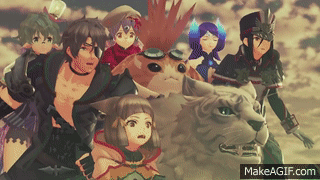
The Issue Addressed In Japan & Beyond
Now we do not have nano-machines capable of recreating life just like in the game, however this theory can be applied worldwide and we can see attempts made by environmentalists and scientists in trying to actually help nature. Conservational places are crucial in preventing a species from going extinct so when there is no more of a important species left to keep a habitat going, conservation areas already created backups (artificially using human interventions) to release it back to the wild. Additionally, we have scientists creating breakthrough DNA manipulation to revive a species, so indeed it proves the existence of a debate of whether nature needs human's reliance and vice versa, or nature and humanity are and will always be separate.
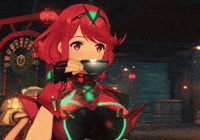
My Personal Takes
Honestly, I thought humans are part of nature since they branched from other animals through evolution, however I can see why in most cases humans are treated as a different force, rather than being part of the force of nature itself. I am a human, and I'm pretty sure you and the audience are all humans (correct me if I'm wrong?), so as a human, I can see how we branch out of the force of nature due to our developments like technologies and exploiting or manipulating nature, something nature itself cannot do (we feel like gods and animals are inferior).
So, regarding the debate if nature relies on us humans and vice versa, I think that is a yes because we are not like fully integrated into the force of nature so if nature dies, we could still be alive and genius could figure out how to recreate nature artificially. On the other hand, the reason why humans would be recreating nature is that humans need resources like food and clean water or bio products for their survival. However, this is still quite of a debate and my opinions or perspectives here might not be compatible to the debate itself (this can also be an issue too).
7 notes
·
View notes
Text
I am so sick of binge-watching anime so it was interesting to watch whatever this was for a change. Furthermore, I’m also tired of writing and my hands hurt :/. ANYHOW, the Xenoblade Chronicles 2 cutscenes were an interesting insight into the game. Like Nausicaä of the Valley of the Wind, the game also focuses on environmental issues and shows the environmental destruction that humans cause in the environment. This actually reminded me of another game I have been interested in playing called Endling: Extinction is Forever. This game also features a world where pollution and human activity has destroyed the environment and you play as a fox trying to navigate the harsh world and protect your cubs. You can also watch as the environment gets worse and worse as the game progresses. Playing as an animal really helps you connect with nature more and realize just how bad pollution really is.
Back to Xenoblade Chronicles 2, the characters have to work together to restore nature. Similarly to Nausicaä of the Valley of the Wind and Endling: Extinction is Forever, the damage is already done and the characters have to try to reverse it. By showing post-apocalyptical world, the authors’ hopes are to encourage people to feel moved and upset by the destruction that humanity has caused and take real world action to prevent it. However, this rarely actually happens, and after feeling sad for a while, people eventually go back to their daily lives not caring about the environment. This is unfortunately a sad reality. However, it can also be argued that it should be governments, businesses, and people in power who should be making the biggest efforts to protect the environment, but they do not. One of my essay group members was arguing this in their essay and I absolutely agree.
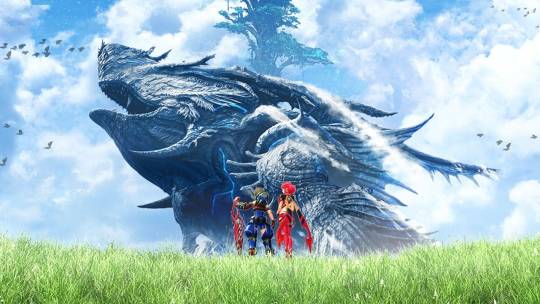
1 note
·
View note
Text
I have watched a lot of Studio Ghibli movies but surprisingly not this one until this course. I agree that the art, animation, and music for this movie were beautiful, though I am not surprised! That's true that both the world in Nausicaä of the Valley of the Wind and Neon Genesis Evangelion are destroyed as a result of human actions. It is only after humans realize that the jungle is actually healing the Earth that humans take a step back and try to stop destroying the environment. I also really liked Princess Nausicaä and how she had a connection with nature and the animals.
Blog Post - Nausicaä of the Valley of the Wind ᯓᡣ𐭩‧₊˚ ⊹
I have very fond memories of watching Nausicaä of the Valley of the Wind last year. During my and Dad's flight to Japan last summer, we downloaded all the Ghibli films we hadn't watched in preparation for the Ghibli Museum in Mitaka. Going to Japan, but ESPECIALLY the Ghibli Museum was on my bucket list for so long because I'm such a huge fan of Ghibli, so I wanted to make sure I could enjoy every bit of it! And I'm glad I did, as I don't know why I never watched Nausicaä until then. Not only is it (kind of) the studio's first release (since technically it was created and directed by Hayao Miyazaki even though the studio was founded after its release), but it's also just a beautiful animated story that holds up great even today.
During my second watch, I noticed Nausicaä of the Valley of the Wind has a similar setting and tone to Neon Genesis Evangelion. Both stories are set in this post-apocalyptic world populated with monstrous, alien creatures. Although, it seems Nausicaä's world is more far gone than Evangelion's. The air is barely breathable due to the spore-like infection covering almost every inch of the Earth, and massive insects that could crush any remaining human civilizations. However, unlike the Tokyo-3 citizens, Nausicaä stresses to her people that cohabitation with insects and humans is possible. If anything, similar to Evangelion, Nausicaä of the Valley of the Wind illustrates that humans are the root cause of violence and destruction. The soil and water were polluted by the wars thousands of years ago, which caused the air to be unbreathable, all the plants to be lethal and the toxic jungles to grow.
Side note, I absolutely love the music for this movie. Joe Hisaishi ate so hard with the 8-bit synthesized fantasy score, it tickles my brain so well.

16 notes
·
View notes
Text
You are so real for this post T^T. The movie was pretty confusing for me too, and I admittedly had to read some summaries online after watching to actually understand it. The only meaning I got from this movie is the importance of individuality... but that was basically it. Though I guess in the universe that Shinji and the others were living in, maybe it was so bad that just living in a singular consciousness may have felt like a tempting bargain, that way no one would have to suffer, feel pain, etc. But then again, you could just sleep or something.
The End of Evangelion | Themes of Individualism & Reality

The Plot Of The Anime
After the massive destruction and near human extinction, traumatic flashbacks of Asuka Langley Soryu's mother committing suicide, as well as the defeat of her beloved Evangelion Unit-002, we can see that Asuka is comatose, and Shinji Ikari is trying to wake her up, but eventually goes desolate and not responding.
All the Angels have been defeated and there isn't much to do with the Evangelions now. We also get an insight into the Human Instrumentality Project, which Gendo Ikari and SEELE (a secret organization) proposed to force evolve humanity. They believe that humanity reached its evolutionary limits (as we can see Angel species dominate in power) and calls humans and living beings weak and flawed. They thought that merging the existence of everyone into one whole, super-entity, instead of making the beings independent, would make them stronger and comparable to entities like the Angels, as well as solving independent struggles and hating of their own kind. Gendo, personally pushes the project just to see his dead wife again. SEELE, however is hacking NERV's Magi super computers so they can do their agenda before Gendo can, eventually turning into all-out war.
In the near end, Shinji goes hysterical as he witnesses the awakening of the angels (Lilith), a part of SEELE's master plan towards instrumentality.

The Issue In Question
Honestly, this movie took on a very weird and disorienting storyline, so finding themes were quite hard to do so. However, I want to talk about individualism in the space of reality. In the end, the anime talks about reality and the fact the composition went from anime to cinematography. Reality is reality, and you cannot escape it. Dreams and fantasy are where you can find happiness, but it is temporary, and reality will always come for you in the end. Individual-wise, if there was no individuality, and if all entities merged into one, you will be everyone but also nobody. There will be no pain, no suffering, no individual thinking. The concept of fear is lost, there is nothing good in this new combined reality. We see that there is a 5 billion year cycle between individual humans and a single god, and neither can coexist at one period (humans probably messed up injecting angelic remains into individual beings). We can only have individual humans, or all the humans merging into a one supreme being.
So what can I obtain from this? I personally don't have a clear answer. Also, watching this movie quite damaged my mentality in some way. However, I might suggest that what an individual must find is happiness, by facing the fears of society, and suffering through pain. Society and the individual must understand each and they are humans and humans are humans, separated by individualism and scattered from a spectrum whole. But who knows, the movie seems interpretive anyways.

The Issue Addressed In Japan & Beyond
Our world is reality, the place we live and the place we are conscious in. In our world, there is no escaping. Dreams and fantasy are inside our reality and are temporary means of happiness, whether that is sleeping or diving into fiction. It is important for an individual to find happiness in their life and there are no shortcuts. Pain, fear, and suffering are all part of the cycle of living, especially you, and one must suffer through it while maintaining your individualism (be like yourself), which is a good thing as other people can understand who you are in reality and you will find some good helpful people. Our reality does not have a single being just like how all the souls merged in the anime, we have to cope living in this reality.

My Personal Takes
I don't know. My previous statement is what I think about my reality. The movie itself felt like a fever dream, and I writing like I am going through that phase in this blog. My reality is shared among everyone but it is the individual that isn't shared. My individual, my body, my control. By being an individual, I have my own will to shape and bend reality how I want (however in small local bits and if I am confident enough with no pain, fear, nor suffering blocking my path). How I perceive myself and the forgoing reality is destined to becoming my future. I had this kind of thinking and it applies especially in college. If I have a strategic path through reality and have the confidence to execute it, the future will eventually bring me happiness and success.
--- Hysteria mode has ended ---
11 notes
·
View notes
Text
Aw, yeah I felt bad for Asuka because she seemed so lonely and left out despite her harsh personality. The way you described her feeling envious over Shinji is also definitely a trope I've seen quite a bit in anime. Specifically there is one character who trains very hard to be the best at what they do, only for another completely inexperienced character (usually the main character) to come along and have some special talent that makes them better than them. One show with this trope that I'm reminded of is Little Witch Academia, where Diana works hard to be the top student in the class, but then Akko who isn't even from a witch family comes along and is chosen by the Shiny Rod.
Blog Post - Neon Genesis Evangelion Part Two ᯓᡣ𐭩‧₊˚ ⊹
I don't know why I thought part two would be a new season, but it was just finishing off the original Neon Genesis Evangelion. I appreciate that choice so it's easier for us to follow the show! And I'm really excited that Asuka Langley Soryu was introduced in the first episode! She's like the og "tsundere" girlie and I love her for that. Asuka is such a petty girl boss and is also an interesting parallel to Shinji's and Rei's more quiet demeanors.
When Asuka is introduced to Shinji and his classmates, they are immediately surprised by her brash attitude. It might be due to her German descent that the Japanese characters are taken aback by her prideful personality. However, I believe it has nothing to do with where she comes from, and Asuka only comes off as confident to mask her insecurities. When she finally meets Shinji, the Third Child, she is jealous that he can effortlessly sync to his Evangelion, instead of going through the long training that she and Rei went through. In an attempt at friendliness, Asuka tries to bond with Rei about this dilemma in the locker room, saying sarcastically "He did it so effortlessly it's a little frustrating, you know? He's amazing! Magnificent! Tough! Too tough! Ooh, Shinji the Mighty! Our jobs will be so much easier thanks to him! Right? We'll have to work super-duper hard to keep him from leaving us in the dust!" Yet, her conversation falls on deaf ears as Rei leaves her alone mid-sentence. And she isn't the only one who doesn't care about her. Even though she should be at least acquainted with Misato and Shinji because the three of them live together, it's clear by the body language that they consider Asuka a very annoying roommate. All of this neglect doesn't just make Asuka feel more insecure about her capabilities as a pilot, but alone in Japan without anyone to truly connect with. It makes me feel really bad for her.

9 notes
·
View notes
Text
Hi! I also thought of Mobile Suit Gundam when I watched this anime lol. Except while Mobile Suit Gundam was more action-oriented with a lot of fighting and the protagonist bravely saving the day, Neon Genesis Evangelion was much darker and covered more psychological topics, which I found more interesting, and Shinji was far from brave. I also love that you related to Shinji on common masculine traits (or lack thereof). I think it's unfortunate how society tries to put expectations on people based on their gender when there is so much more room for people to explore their own identities, personality, and interests.
Neon Genesis Evangelion (Part 1) | Themes of Masculinity & War

The Plot Of The Anime
Violent enemies, called Angels, roam the planet Earth and cause havoc on the human created infrastructure. A young boy named Shinji Ikari is forced to join the NERV (a secret organization under the United Nations who battles against the Angels) by his father Gendo Ikari, who is a commander of the organization, with complex relationships with him. Gendo is also the director of the construction of the top-secret Evangelion weapon project. Shinji eventually is tasked to control Evangelion Unit-01 to battle against the Angels with his group, which Evangelion Unit-01, being a powerful giant biological mech, much like what you see in Mobile Suit Gundam (I should stop making references to that dumb anime).
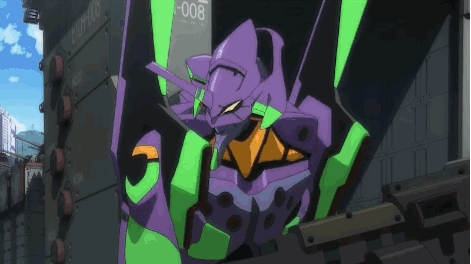
The Issue In Question
In episode 1, we can clearly see themes of masculinity crossed with themes of war. Gendo is the director and has a powerful position in the United Nation's secret initiative, NERV, who was also chosen by his authorities to do what he wants in control. We see that this reflects the male hegemony system, where males dominate over females in crucial positions or missions. Additionally, we can see the father wants his son, Shinji to be the one to pilot the mech and engage in war, which also shows this pattern of passing that male hegemony system down as society expects men to be mentally strong and discipline, even though Shinji is a child. However, Shinji is more of a different person, showing a presence of a female's gender performance (according our society), refusing to pilot the mech and go to war, which subverts the social norms in the anime. This is also one of the reasons why the son-father relationship is poor as the father is seen more as a masculine figure while the son has a more feminine figurine side, but I will probably discuss more on that on another blog as the focus for this blog is male hegemony.

The Issue Addressed In Japan & Beyond
Male hegemony is very present in our modern world and even has been the same historically. Men are more likely to take on very powerful positions such as being a president of a wealthy nation, a general of a powerful military, or even a CEO of a large company. In Japan for example, there hasn't been a female prime minister yet, nor in the United States, has there been a female president. Most if not all CEOs of the most valued companies around the world are occupied by males. of In the This leaves women to take on less powerful positions, specifically roles that meet what society expects in gender performance like nurturing or housework for women. However, this situation has been improving as a result of awareness for gender equality and the laws passed with it. Females started rising in importance in society and are praised for taking more powerful roles males formally took on.

My Personal Takes
I want to talk about my personality and my physiques as a male and how it doesn't really reflect how society imagines a true male looks. Men tend to look tall, muscular, and handsome as those are physical traits that make of masculinity (sounds like muscular). I do not possess most of those traits as I am a lean person who often loses in arm wrestling. However, I am tall, but not as tall as some of the more masculine dudes out there, and also I did not win the genetics of having a handsome facial features like a diamond-edged jawline.
The more related personal aspect of me to this blog is the personality aspect, where my dad's personality is very ruthless and scary, especially when he gets mad. I do not have those traits as my siblings don't seem to be scared of me at all. I do have a big soft side like Shinji in the anime and also have contrasting personalities to my dad just like Shinji and Gendo.
10 notes
·
View notes
Text
As a Studio Ghibli film, Nausicaä of the Valley of the Wind was another beautifully made movie, as expected. The film apparently is even regarded as one of the foundational works of the film. The movie itself was set in a post-apocalyptical world. A thousand years prior, the “Seven Days of Fire” destroyed an industrial civilization and in its place created the “Toxic Jungle,” which is a large forest filled giant insects and toxic plants. Humanity is scattered into isolated settlements, struggling to survive against the Toxic Jungle. Nausicaä is a kind-hearted princess of the Valley of Wind who cares about all living creatures. As a result, she goes to the Toxic Jungle to try to understand it and the creatures better and create mutual understanding and agreement. However, the Tolmekians do not want to reason the Toxic Jungle and instead want to use a powerful biological weapon to wipe out the Toxic Jungle. Nausicaä tries to protect her people and stop the Tolmekians from fighting the Toxic Jungle. Nausicaä is captured by the Tolmekians, but she escapes with the help of Asbel, and the two of them journey through the Toxic Jungle. During their journey, they learn that Toxic Jungle is not actually an evil jungle trying to destroy humanity, but rather natures way of trying to cleanse the earth from toxins and pollution.
Overall I enjoyed the movie. I think it does a good job highlighting the crucial role the jungle plays in cleaning and caring for the Earth, as well the ignorance of people like the Tolmekians who are eager to destroy for their own selfish purposes instead. I also adored the animations and characterization of Nausicaä as compassionate yet brave princess who has a deep connection to nature and goes out of her way to try to understand the jungle instead of immediately demonizing it. I think she is similar to Princess Monoke, who is also from a Studio Ghibli movie, as they both have a special bond with nature and animals.

1 note
·
View note
Text
“The End of Evangelion” is a film that provides an alternative ending to “Neon Genesis Evangelion.” “Neon Genesis Evangelion”’s original ending ambiguous and controversial. The last few episodes in the original series explore the characters’ psyches and explore themes of self-acceptance, the human condition, and search for meaning. However, many viewers were unsatisfied with it, especially since it left many questions unanswered. I personally thought that the fact that the ending was open to interpretation was somewhat more impactful because it made me think more, but at the same time more information would be nice.
I think that “The End of Evangelion” was quite different from the original series. NERV is invaded by SEELE, an organization who’s goal is to launch the Human Instrumentality Project. The Human Instrumentality Project is a project that aims to revive Lilith and merge all of the human souls into a single consciousness. SEELE succeeds in launching the Human Instrumentality Project and Rei is merged with Lilith. This triggers a series of apocalyptical events, and all of the human souls are united into a single consciousness. Shinji is forced into the core of Instrumentality where he confronts his darkest fears, desires, and regrets. He is then forced to make a decision in which he can choose to merge all of humanity into a single entity, or allow everyone to return back to their human bodies and preserve individuality. Shinji chooses the latter, and all the humans’ consciousnesses divide and return back to their bodies.
Overall I think this film was interesting because it explored consciousness and an attempt for humans to reach a higher state of being by merging their consciousnesses. While the idea was intriguing hypothetically, I think the ending emphasized the value of individuality. Individuality and our ability to choose our own paths and self-expression allow us to create our own meanings in life and are ultimately what make life worth living.
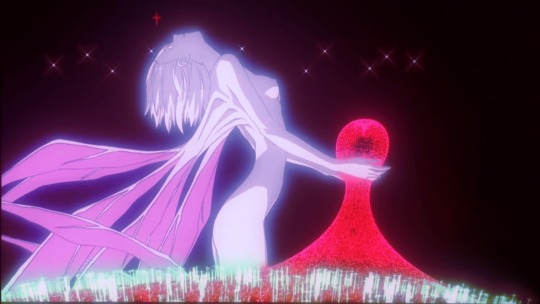
4 notes
·
View notes
Text
“Neon Genesis Evangelion” part 2 was more interesting in my opinion because it focused more on the psychological impacts of the Evas and Angels on the characters and the true natures of the Evas, Angels, and NERV. Personally, I am a huge fan of psychologically dark shows, especially when there is a plot twist that reveals a some true disturbing nature of the world, agendas, etc. My only complaint is that we skipped a lot of episodes so it kind of killed the suspense :/. I definitely want to rewatch this series in the future though since it was very interesting
As the series progresses, Shinji faces mental trauma from using the Eva Unit 01. This shows that piloting the Evas drains a lot of mental energy, which makes more sense later when we learn that human souls power them. Shinji also gets trapped inside of an Angel named Leliel. This experience forces him to face his inner fears and anxieties like a nightmare and he is traumatized from the experience after he is rescued. Shinji also later has to fight his friend who his piloting another Eva because it becomes possessed by an Angel. The physical and mental tolls that his experience piloting the Evas takes on him and his friends cause him to start questioning NERV and his father who leads the organization.
At the end of the series, humanity is saved, but at what cost? I think this series really showed a nuanced perspective on heroism where it eventually became unclear about what was right and what was wrong, what NERV’s true motive was, and whether sacrifices that Shinji and his friends made to protect humanity were worth it. I think it raises the question of should individuals be responsible for making sacrificing—or even sacrificing themselves—for the greater good of society?

0 notes
Text
“Neon Genesis Evangelion” was a very interesting (and confusing) watch. The series is set in a post-apocalyptic future fifteen years after a global cataclysm. Humanity has to fight against supernatural beings called Angels using machines called Evangelions. Shinji Ikari is a 14 year old who is chosen to pilot one of the Evangelions. The series shows his struggles with the pressure of defending the world from Angels while still having to deal with his normal life as a student.
“Neon Genesis Evangelion” is another shonen anime that follows a young boy who faces many challenges and responsibilities that seem insurmountable. However, with hard work and determination, Shinji manages to overcome these challenges and protect the world that he lives in. However, the anime also shows the troubles Shinji faces in his relationships, specifically his relationship with his father. His father, Gendo, is cold and distant after his mother is absorbed into Evangelion and tries to bring her back.
Overall, I think this anime was very interesting but also very confusing. I had to read up on some of the backstory to understand it better, and I think it makes a lot more sense on where the Angels came from, why the cataclysm occurred, and how the futile attempt for humanity to reach godhood ultimately ended up causing more destruction and death. Additionally, the anime also has many creation biblical references with the two seeds that happened to land on the earth being Adam and Lilith, and the enemy Angels are Adam’s creations, while humanity and the rest of life are Lilith’s creations. Additionally, while Adam had the fruit of life, which gave the Angels strong power, Lilith had the fruit of knowledge, which gave humans knowledge to grow and advance as a civilization, so much that they themselves tried to become gods.
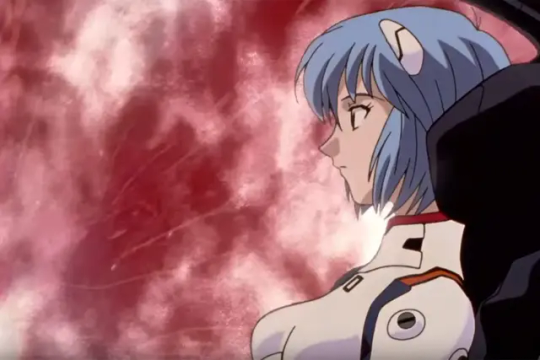
2 notes
·
View notes
Text
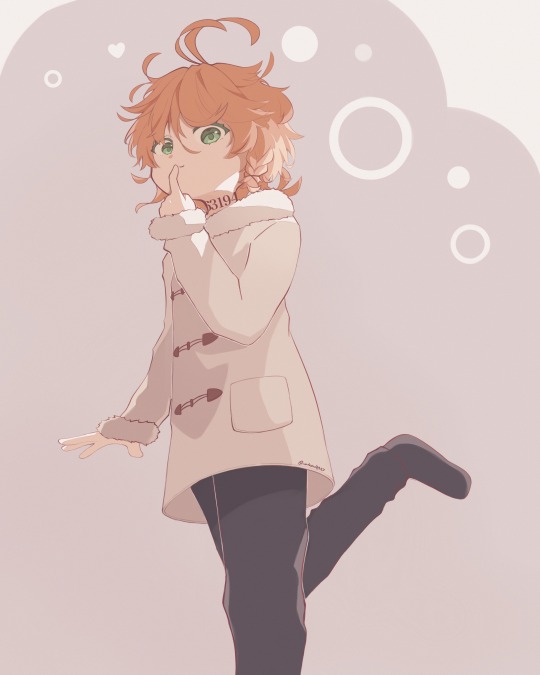
I know I've been posting a bunch of analyses for my anime class, but here is some of my art! A recent drawing I did of Emma from The Promised Neverland.
#the promised neverland#tpn#emma tpn#anime art#art#anime and manga#digital art#artists on tumblr#my art
44 notes
·
View notes
Text
LOL going to an anime con with your dad must have been wild! I could never imagine bringing my parents to an anime con, they would probably think I was crazy. That's so cool that you went to so many conventions including MegaCon!! I have only ever went to SwampCon, which was certainly lots of fun, but I would definitely love the chance to go to more cons and larger cons. Also, I love your Sophie Hatter cosplay!! It's very on point! In hindsight I honestly wish I cosplayed for SwampCon, but I am definitely looking forward to cosplaying for the next anime convention I go to!
Blog Post - Convention Preview ᯓᡣ𐭩‧₊˚ ⊹
I've always enjoyed participating in fandom experiences! Though, I haven't been to anything crazy, like Comic-Con or Anime Expo. My most notable were just a few local Florida conventions. But they were still fun overall and gave a great look into youth culture and fandom communities with its vast amount of participants around the globe and things tailored for each fandom.
My first convention was PolyCon at Florida Polytechnic University. I don't remember much about it because it was a couple of years ago, but would say it was a good time! The convention itself was pretty quaint with not a lot to do and not many people attending besides Polytechnic students. But for being my first exposure to convention life, I was enamored. There was also a student-run maid cafe that was amusing to go to, specifically because my dad came to the convention with me. Younger me had absolutely no idea how to explain to my dad why a bunch of college students were in cat ears, maid costumes, and doing intricate dance routines. He was so confused... it was lowkey hilarious but also embarrassing.
I'd say the most memorable convention memory I have is when I went to Mega Con in 2021! It wasn't super long after the COVID quarantine got lifted, and so until then, I hadn't gone to anything or seen many people for what felt like a long time. Being able to go to a convention (of course, by then it was safe to be in public spaces) and simultaneously going with my best friend for her first time was just what I needed. However, it was very different with COVID regulations still in place, like masks and social distancing. But I did notice the convention felt like a sense of normalcy for many con-goers after the pandemic. Everyone I met was so kind (and that's rare because you're bound to run into a few bad eggs or creeps), and every cosplayer I saw, even with the masks, made the most out of their costumes! My best friend and I also tried to cosplay as our favorite characters from Demon Slayer because the anime was a huge comfort to us while we holed up inside our homes with nothing to do. Yes, I think my costume was horrible because I am no professional, and I lowkey hate looking at pictures of it, but it did act as a nice escape from the COVID-filled reality at the time. Because of that, I was so happy to spend that precious time with my best friend! And buy a lot of stuff in the artist alley because Mega Con's is so big lol.
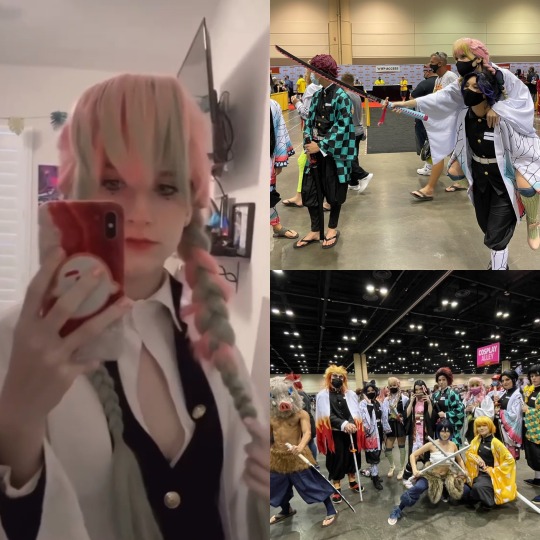
Another convention I went to earlier this year was the University of Florida convention, Swamp Con! I never knew until later in my first semester that UF held its own convention, and I think more students should know about it! Swamp Con is an event completely run by students in the Reitz Union, which I think is super impressive based on how many activities there were to do! There were panels, quizzes, performances, cosplay contests, an artist alley, outdoor games, special foods and drinks, and even a maid cafe (which was so funny to see a second time in a college). I also cosplayed again for this convention as Sophie Hatter from Howl's Moving Castle, which is such a huge shocker based on my Tumblr.
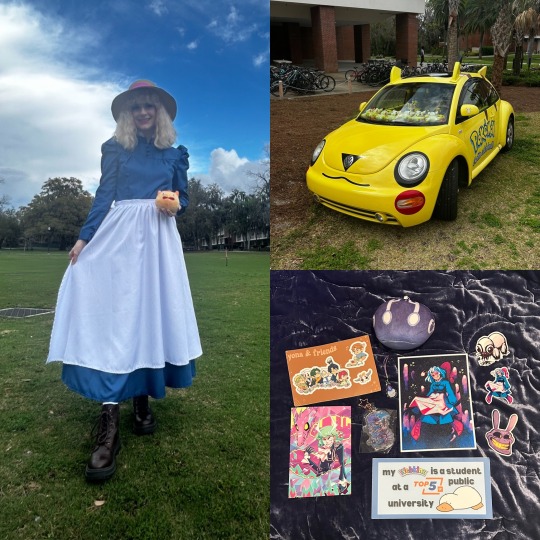
Overall, the convention setting on a college campus took an unseen pressure off, which is something I also remembered feeling at PolyCon. I thought that would be an interesting thing to point out compared to venue conventions!
16 notes
·
View notes